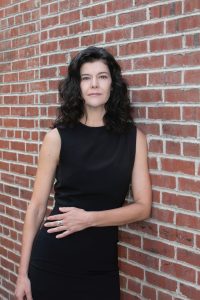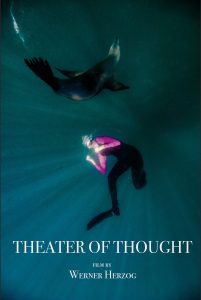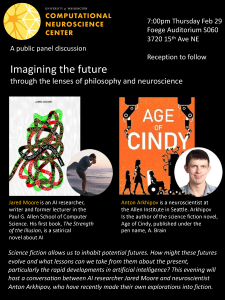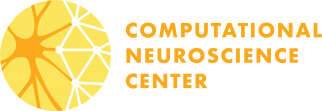Neuroscience, AI, and Society
A seminar series featuring scientists, thinkers, and writers on the intersections of neuroscience, artificial intelligence and society.
Upcoming Seminars
Past Seminars

Elusive Cures: Why Neuroscience Hasn’t Solved the Mystery of Brain and Mental Illness
October 1 2024
K069, Health Sciences, 7:00 pm
Understanding the human brain is one of the great scientific challenges of our time. Progress in brain research has been accelerating rapidly for decades, following breakthroughs in biotechnology and artificial intelligence. But the translation of discoveries about the brain into treatments and cures for brain and mental disorders has not happened as many expected. What’s been missing?
In this event, Nicole Rust will take us on her personal journey to find answers. Drawing on her decades of experience on the front lines of neuroscience research, she will reflect on the history of our quest to understand the brain, how far we have come and what remains to be discovered. She will argue that treating a brain or mental disorder is more like redirecting a hurricane than fixing a domino chain of cause and effect, and that only by facing the brain’s complexity head-on will we have any hope of finding better treatments and cures. She will profile the pioneering ideas about the brain and mind that researchers are using to tackle this complexity, and the reasons we can be optimistic that the next few decades of brain research will be more impactful than the last.

Theatre of Thought
May 14 2024
As part of the CoNectome 2024 meeting, we screened the Werner Herzog documentary Theatre of Thought, followed by a Q&A with Rajesh Rao, moderated by CoNECT.

Imagining the Future
Jared Moore and Anton Arkiphov
February 29, 2024 7:00 pm, Foege S-060
Reception to follow in the Vista Cafe
Science fiction allows us to inhabit potential futures. How might these futures evolve and what lessons can we take from them about the present, particularly the rapid developments in artificial intelligence? This evening will host a conversation between AI researcher Jared Moore and neuroscientist Anton Arkhipov, who have recently made their own explorations into fiction

The Neuroscience of You: How Understanding Your Neural Lens Can Help You Connect with Others
Chantel Prat, UW Psychology
December 7 2022, 7:00 pm, HSB K069 (Health Sciences)
RSVP at https://forms.gle/qgUHDUbpTafYzfo78
Reception to follow in the Rotunda
We are living through a social paradox in which an expanded appreciation for the importance of diversity co-exists with tense divisions between people who believe different things. How might knowing the ways each unique brain understands the world help us to connect with others who work differently? In this lecture, I’ll share some examples from my new book, The Neuroscience of You, which was written to help readers understand how their biology and experiences shape the lens through which they perceive things, including others.
The talk will also be streamed at https://washington.zoom.us/j/98163043709


Living with an aging mind:
Personal, philosophical and practical considerations
A conversation with Noga Arikha and Barak Gaster
October 14 2022, 7:00 pm, Foege Auditorium (Genome Sciences Building)
Register at https://forms.gle/qgUHDUbpTafYzfo78
Reception to follow in Vista Cafe
Dementia affects a significant fraction of the aging population. We host a conversation between physician Barak Gaster and philosopher of science Noga Arikha to discuss the experience of living with dementia and practical steps one can take to prepare for this contingency.

NeuroRights: Human Rights Guidelines for Neurotechnology
public lecture by Rafael Yuste
December 2, 7:00 pm, Foege Auditorium (Genome Sciences Building)
Reception to follow in Vista Cafe
The development of Neurotechnology, defined as novel methods to both record and alter brain activity, is poised to have a transformative effect in science, medicine and society. At the same time, neurotechnology, particularly when combined with AI, could have severe ethical and societal consequences. In this talk Yuste will review the proposal made by the Morningside Group in 2017 to introduce new human rights into the Universal Declaration of Human Rights and provide ethical guidelines for neurotechnology development and its deployment. These “NeuroRights” protect mental privacy, personal identity and personal agency, and guarantee fair access to cognitive augmentation and protection from algorithmic biases. To help implement these rights, we propose to follow the medical model, introducing a “Technocratic Oath” as a deontology in the neurotech and data industry and using existing societal mechanisms similar to those already implemented in the medical industry to regulate future development of Neurotech and AI. Finally, I will discuss current advocacy efforts for NeuroRights in different countries, including Chile’s recent NeuroRights constitutional amendment and bill of law, Spain’s Charter of Digital Rights, as well as the United Nations.

Ethics in the age of AI
public lecture by Blaise Agüera y Arcas, VP and Research Fellow, Google Research
June 10, 7:00 pm
We are in an era of heavy AI marketing alongside intense AI anxiety. What is AI, what is its true status now, and what are the implications of AI for the future? Recent dramatic advances in artificial neural networks have brought machines capable of superhuman visual recognition, game playing, and realistic dialogue. From here, we can make some informed guesses as to where the next few years might take us. This is a basis to think about a hybrid future of social relationships between intelligences of many kinds and scales— from tiny smart devices, to people, to corporations, state actors, entire economies and ecologies, and ultimately the planet as a whole.
Register here

In Silico film screening
with discussion with director Noah Hutton
May 5, 7:00 pm
A young filmmaker sets out to document a brilliant neuroscientist who has become frustrated with his field’s status quo. With time elapsing and millions of dollars on the line, In Silico explores an audacious 10-year quest to simulate the entire human brain on supercomputers. Along the way, it reveals the profound beauty of tiny mistakes and bold predictions — a controversial space where scientific process meets ego, and where the lines between objectivity and ambition blur.
Register here


Peter Sterling
Professor of Neuroscience, University of Pennsylvania
“What is health?”
February 19, 2020

Christof Koch
President and Chief Scientist, Allen Institute for Brain Science
“Proust Among the Machines”
January 22, 7:00pm

Lawrence Weschler
Author and Humanist
A talk on his recent book, “And How Are You, Dr. Sacks?” a biographical memoir on his friendship with Dr. Oliver Sacks
October 9, 2019

Patricia Churchland
Professor Emerita, University of California San Diego
“The Brains Behind Morality”
May 30, 2019

Genevieve Bell
Director of the Autonomy, Agency, and Assurance Institute at Australian National University
“Decolonising Artificial Intelligence: the arc of the new cybernetics”
April 15, 2019

